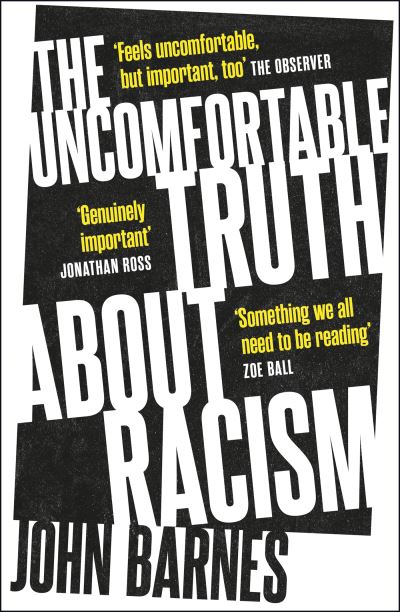
The first Piece of fresh thinking on the subject of race in UK society since the 1980s - A work of genius.
Please, please, please do not be put off by a bold, vaguely 'in your face' title or the fact that - in these times of information overload induced intellectual, moral and compassion fatigue - such a book seems to promise merely a rehash of ideas we have already heard and (secretly) have about the same emotional energy for as we do for Covid protocols. If you are a person who has EVER felt even one moment of impotent anxiety in relation to race-related questions in modern society (essentially, if you are even one millimetre left-of centre politically), you will be rewarded with a plethora of dazzling and thought-provoking insights for reading this book. It is, hands down, the most incisive, insightful and promising treatment of this amorphous, intractable and elusive subject I have ever encountered. I know what I am talking about as that experience began with the incendiary and consciousness-raising Autobiography of Malcolm X (read as a 19 year old forty years ago) and includes studying Philosophy, Politics & Economics at Oxford University. While there, I wrote a 20,000 word thesis assessing whether the small business route by which Jews had penetrated the English middle class in the past (and East Asians were in the process of doing in the 1980s) was the silver bullet to solve the issues around anti-black racism (I said it wasn't and that has proved to be the case) and - for a term - ran a section called Black Perspective on Cherwell, the university newspaper. Yes, I am a Liverpool fan who, back in the day, recognised John Barnes as probably the best - and certainly the most exciting - player in British football. This brings me to something of an existential takeaway from the experience of reading this book: weirdly, the level of flair which John Barnes demonstrates in the treatment of his subject matter in this book is kind of on the same level as that with which he differentiated himself on the football pitch. There is actually one set-piece hypothetical scenario, around page 100, involving the Queen, Donald Trump and some ordinary people being stuck in a lift together which touches on genius in the effectiveness with which it illustrates the point he is making. You can tell it is class because you immediately know that the scenario is something which could be developed much further by himself or someone else. What this seems to suggest to me is perhaps that 'genius' is a state of mind or maybe 'way' of mind which does not limit the possessor of that mind to pre-eminence in one given field but will manifest itself in any field subject only to the the possessor of that mind applying him/herself to said field for a suitable amount of time. Interesting.
Also interesting - but not in a good way - are some eminently avoidable errors of grammar and syntax: up to the point I am at (just past page 100), 'sparring' has been spelt with one 'R', and 'free reign' is printed where, obviously, 'free REIN' is meant. Small things but if I was Barnsey I'd be pulling my hair out at the proof readers at his publishers not picking them up...
Barnsey also makes no bones about the fact that he is going to write as he speaks from the outset. This definitely enhances the authenticity and therefore readability but there is at least one sentence somewhere in the first 50 pages which defeated me comprehension-wise so I just had to move on after reading it about ten times. It was his final point on the topic so I already had the gist of what he was saying so it did not detract from overall comprehension. The other thing which will provide ammunition to the 'haters' which such a forthright, breathtakingly honest, and intellectually courageous work will inevitably draw is the fact that - not having spent 30 years reading around European history like a university graduate such as myself - Barnsey, though essentially correct, is sometimes sketchy and over-simplistic in what he says about The Slave Trade and related historical events which seeded the Industrial Revolution, Capitalism and subsequent economic, military and (most perniciously) cultural pre-eminence for Western Democracy.
Again though, that has no bearing on the intellectual freshness, innovativeness, and sheer humanity with which he deals with his subject matter.
In this book, John Barnes shows himself to be among the foremost social theorists on modern British society and certainly the most lucid and compelling. The other most interesting book I have read on British society is 'The Condition of the English Working Class' by Friedrich Engels (yes, THAT Engels! But it is purely descriptive with no dry theory anywhere). Of the many hundreds of books I have read in my life, that was the most horrifying and impactful despite just being social history. I can tell from his book that John Barnes has not read it and I really hope he comes across it at some point because - with his fertile intellect and agile mind - I think that input would give him much to work with in terms of further developing the seminal ideas in his extraordinary book.